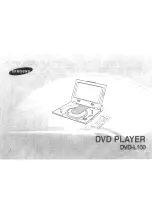
PRODUCT SPECIFICATIONS
PICK UP
System
Compact disc digital audio system
Laser diode
Material : GaAlAs
Properties
Wavelength:
h
= 780nm
Emission duration : continuous
Laser output: < 44.6
µ
W
Error correction
Cross-interleave Reed-solomon code
AUDIO
D/A conversion
DAC four times oversampling
Frequency response
20-20,000Hz (+1/-3 dB)
Wow and filter
Below measurable limits
No. of channels
2 Channel (stereo)
Output level
Headphones : 20mW (32
1
)
Bass boost effect (100Hz)
+8 dB
GENERAL
Power requirements
- 2 x LR6 "AA" alkaline battery
- DC in 6V jack accepts AC power adaptor
(centre positive)
Power consumption
0.8W (DC 3V) under normal condition
Dimension
Approx. 128 (W) x 28.5 (H) x 137 (D) mm
Weight
Approx. 200g not including battery
13
12
USING ANTI-SHOCK AND SKIP FREE PROTECTION FEATURE
Note the "
" indicator appears on display as being empty when the player first
activated. It immediately begins to store sound data in memory bank, the indicator
appears to be "
" when the data buffer is full.
When the laser loses tracking due to mechanical shock, the data stream into the
memory is interrupted but the data output from the memory buffer continues, so
the sound is not interrupted. As the data is read from the memory, the indicator
changes from "
" to "
".
Once the laser locks again on the CD track, the data stream is fed to the memory
and joined to the previous data (see indicator changes) at higher speed, this provides
higher level shock protection than the traditional one.
CAUTION
If the unit is subject to excessive and continuous repeated shocks than expected,
it will cause sound skip. Also note the "
" indicator will appear empty.
NOTES
• When the "ANTI-SHOCK" is operating, the battery consumption is higher
because the disc rotates faster than normal and also the memory circuitry is
activated.
• When the digital anti-skip function is switched "ON" or "OFF", the sound will be
interrupted, and it is normal.
• Remember that condition such as dirty, scratched or warped discs may cause
skipping or noise thereby affecting performance of "ANTI-SHOCK" system.

























